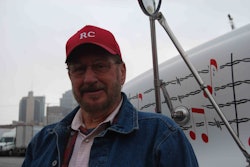As I’ve written about here in weeks prior, former owner-operator Fred Schaffner, a man with a passion for fighting for fairness in the treatment of drivers in the face of regulatory flux and with a keen eye on the regulatory process, came out of the Truck Driver Social Media Convention last October on a mission: to do his part to make drivers’ voices a part of the influential, if relatively young (established in 2006), Motor Carrier Safety Advisory Committee of the Federal Motor Carrier Safety Administration. Among the trucking representatives on the 18-member panel today:
Rob Abbott of the American Trucking Associations
Lamont Byrd of the Teamsters
Robert Petrancosta of Con-way Freight
Danny Schnautz of Texas-based Clark Freight Lines
Todd Spencer of the Owner-Operator Independent Drivers Association
All but Abbott and Byrd trumpet their pasts behind the wheels of big rigs in their bios on the MCSAC members page, but only Schnautz claims continued driving — his bio notes that he hauls occasionally for Clark. It was Schnautz who, at the end of the Wednesday, Dec. 7, meeting devoted to the latest series of recommendations on sleep apnea treatment in the medical certification standards, voiced what little opposition there was to the committee’s late adoption of a recommendation of disqualifying criteria for certain drivers with sleep apnea. (Those criteria are detailed here.)
As with the most powerful thoughts to emerge from the daylong meeting, Schnautz’s statement questioned the lengths to which the committee was going without fully considering the practical nature of apnea treatment on the road, noting idling prohibitions in many states. “You can’t really be treated and drive,” he said. “If we’re going to send a driver out there and tell him he can’t idle, how’s he going to power his CPAP device?” (Several of Todd Spencer’s similarly voiced objections from earlier in the day you can find here, or watch the entire meeting in an archived webcast via this page.)
Schaffner himself, with owner-operator Scott Adams, had been in attendance as a member of the public earlier in the week, during the Monday scheduled discussions of MCSAC’s EOBR subcommittee, which had been tasked with recommending changes to the technical specifications standards as codified in the EOBR rule now vacated by the court. After attending the November EOBR subcommittee meeting as well, Schaffner went into his commentary with the intention of gaining official recognition of the fact that any MCSAC recommendations issued pertained to language in a rule that is essentially nonexistent in the federal code, given the court’s ruling.
He achieved success in that effort. “I can say from what I sat and listened to,” Schaffner says, that “the committee has identified the EOBR rule as vacated and stated the cover letter was to reflect such.”
The fronts on attempts to mandate EOBRs are multiplicitous: mere days after the MCSAC meeting, a Senate version of a new highway bill included language that would mandate electronic logs for virtually all interstate carriers if adopted.
Schaffner’s not carte blanche against EOBRs being required as a remedial directive for a carrier or owner-operator with a safety deficiency, he says, but rather sees any move to require EOBR technology for all or to allow carriers to force the devices on owner-operators against their will as out of bounds. In his commentary at the end of the meeting, he likewise also contended that EOBRs as he believes they will be and/or are being used by motor carriers have the potential to be more of a safety detriment than an enhancer. He presented the example of his brother, who continues to work as a driver and whose truck is outfitted with the fleet’s tracking/communication systems. Two days prior to the meeting, Schaffner said, “he’s dispatched to Iowa, but on his way he’s tired. He decides he’s tired … and needs a couple hours’ rest. He’s not even stopped for five minutes before he gets a phone call from the company – dispatch wants to know why he’s stopped. That’s what carriers will use EOBRs for,” to pressure drivers to keep the truck moving regardless of fatigue situations.
Goal number two for Schaffner was to make certain that the committee remembered that drivers and owner-operators were paying attention. Success there, too, was achieved, he says. The FMCSA’s MCSAC liason Shannon Watson searched out Schaffner and owner-operator Scott Adams after the meeting to detail the nomination process for the two, saying that three posts would be open as of the beginning of the year, says Schaffner. “An online application will be made available and a Federal Register post will be done.” He adds that he plans on doing “what I can to get on the committee.”
The next MCSAC meeting Jan. 4-5 is of the newly formed sleep apnea subcommittee, including members of MCSAC and the Medical Review Board to the FMCSA. They will begin discussion of potential changes to the medical qualifications as they relate to sleep apnea. Check out our notice of it here for details. As for Schaffner, he says he’ll be in attendance. You can find him on Facebook here.











